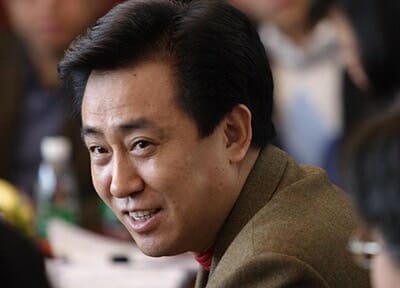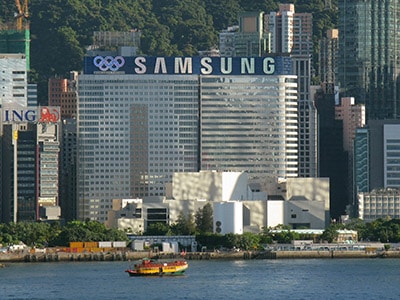
Evergrande boss Xu Jiayin has invested in everything from solar power to plastic surgery clinics
China’s most indebted developer, Evergrande Real Estate Group, has branched out into insurance by acquiring a 50 percent stake in a loss-making Chongqing-based life insurer for RMB 3.9 billion ($617 million).
Evergrande, a top-five homebuilder on the mainland, disclosed to the Hong Kong stock exchange on Sunday that it had agreed to buy a pair of 25 percent stakes in Great Eastern Life Assurance (China) Co Ltd from two companies belonging to the Chongqing city government, and that the acquisition had been approved by Chinese regulators on Friday.
The transaction is the latest super-deal for the developer controlled by flamboyant billionaire Xu Jiayin, after it agreed to buy an office building in Hong Kong for $1.6 billion earlier this month. Evergrande has been pursuing a grab bag of new business initiatives in recent years as compressing returns in the mainland’s property industry have tempted it into out ventures in cooking oil, property management and plastic surgery clinics.
Getting Ready to Sell Insurance With the Singaporeans

Earlier this month Evergrande paid a record $1.6 billion to acquire the Mass Mutual Tower in Hong Kong
In its statement to the stock exchange, Evergrande described the acquisition of the company, which will hereafter be known as Evergrande Life Insurance, as “a strategic deployment for the Group,” and pointed to the potential for marketing insurance products to its existing customer base of homeowners.
The developer is acquiring 25 percent of Great Eastern Life from Chongqing City Construction Investment (Group) Co and another 25 percent from Chongqing Land Group. Both companies are state-owned enterprises belonging to branches of the Chongqing municipal government.
After the transaction, Evergrande will be the company’s single largest shareholder with another city-owned company, Chongqing Casin Group Co., Ltd, still holding a 25 percent stake, and Singapore-government-linked insurer, The Great Eastern Life Assurance Company, holding the remaining 25 percent stake.
With insurance licenses still tightly controlled by the government in China, the stake in Great Eastern China had been offered on a local exchange in August, and Evergrande ended up paying more than twice the original asking price of RMB 1.6 billion, presumably after competitive bids drove up the value of the company.
Great Eastern China had lost RMB 60.5 million in 2013 and another RMB 48.2 million in 2014.
Deal a Downer for Analysts, But Stock Price Jumps
While Evergrande is following the path of many other Chinese developers in diversifying away from its core business as the housing market slows down, it has been more eclectic in most in choosing new opportunities.
In 2014 the company announced a $15 billion investment in solar power, only to abandon the deal within a few months. Evergrande has also set up new businesses in bottled water and movie theaters, in addition to its cooking oil and plastic surgery ventures. According to the company’s 2014 financial results, the developer’s non-real estate businesses recorded a loss of RMB 3.13 billion last year.
While the insurance industry may look more substantial than some of Evergrande’s other new businesses, the new acquisition sees the company already taking some heat from the credit ratings agencies.
“This is certainly not positive for its rating,” Franco Leung, a Hong Kong-based analyst at Moody’s Investors Services was quoted of saying of the Great Eastern deal by Bloomberg. Evergrande had RMB 238 billion in gross debt on its books at the end of 2015, including some controversial perpetual securities.
In the last few months the company has raised another RMB 35 billion in onshore bonds, which has helped it to lower its financing costs, but faces pressure to refinance its perpetual bonds next year, as well as rising liabilities for bank acceptance notes, mortgage guarantees and other payables.
Despite analyst skepticism Evergrande’s stock continues to be an investor favorite in China, with shares rising 5.11 percent in trading today after the acquisition was announced, The company’s stock has more than doubled in value this year.
Leave a Reply